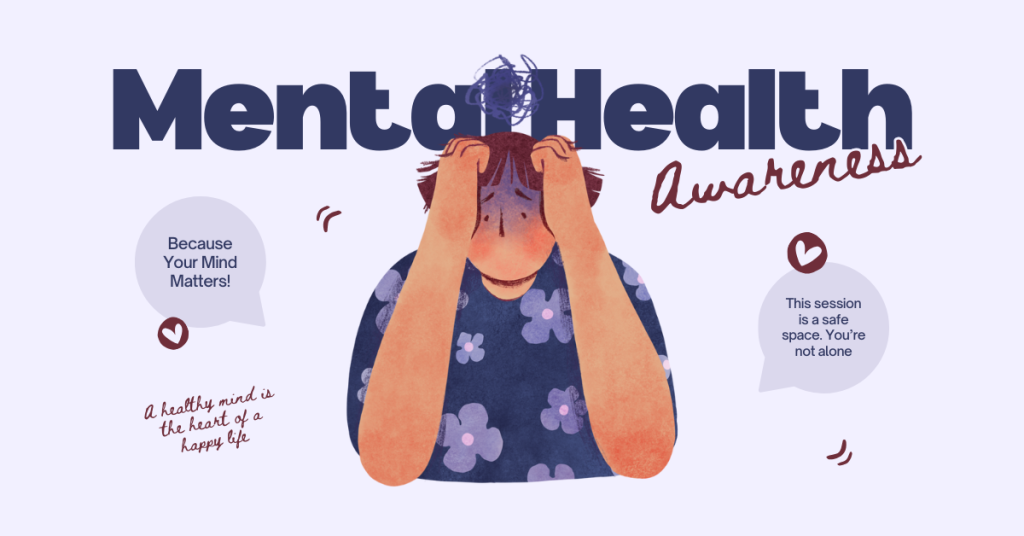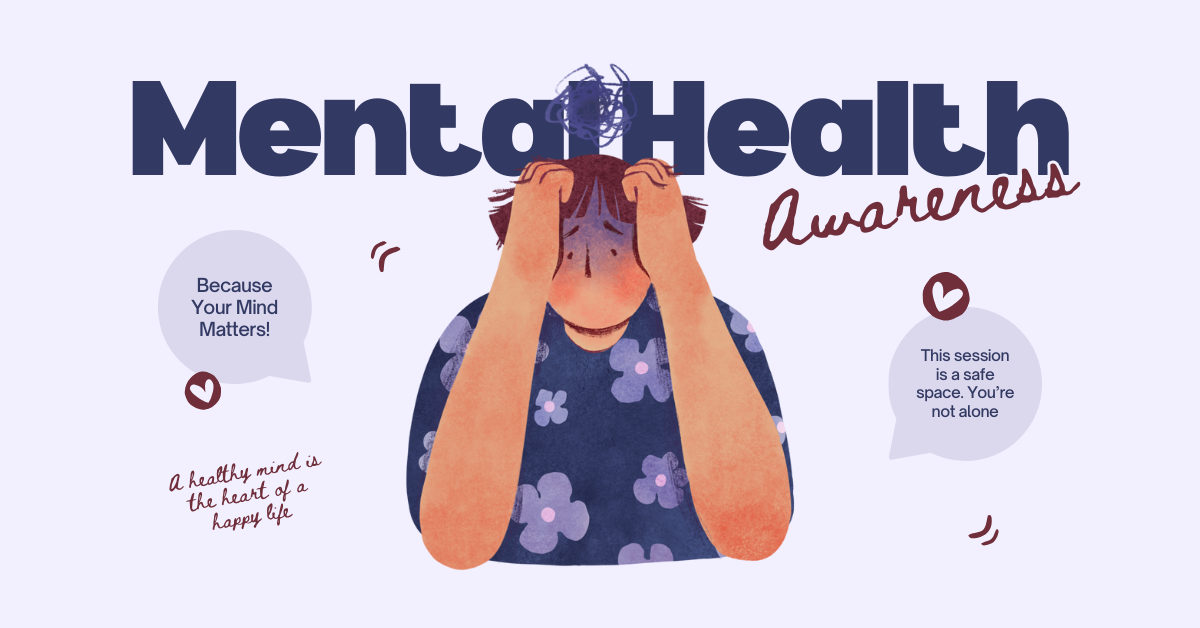Every year on October 10, the World Health Organization (WHO) observes World Mental Health Day to raise awareness about mental health issues worldwide. The day emphasizes that mental well-being is as vital as physical health and encourages individuals and organizations to take proactive steps to support emotional health.
Mental health conditions, including depression, anxiety, and burnout, affect millions globally and often remain underdiagnosed or untreated due to stigma. World Mental Health Day serves as a platform to normalize conversations about these challenges, highlight available resources, and promote sustainable habits that support psychological resilience.
The 2025 theme, “Mental Health at Work”, underscores the growing recognition of workplace mental health. Evidence shows that a supportive work environment, combined with preventive measures and early interventions, can significantly improve productivity, reduce absenteeism, and enhance overall employee satisfaction.

Global Impact and Significance
Mental health issues represent a substantial burden on individuals, families, and economies. According to WHO, depression and anxiety alone cost the global economy over $1 trillion annually in lost productivity. Additionally, studies indicate that nearly 1 in 4 people will experience a mental health condition at some point in their lives.
The observance encourages governments, institutions, and communities to adopt strategies that address these challenges. Educational campaigns, workplace wellness programs, and mental health policies are among the most effective ways to reduce stigma and provide support to affected individuals.
Workplace Mental Health: Challenges and Opportunities
Modern work environments, while fostering innovation and growth, often come with increased stress and pressure. Long hours, unrealistic deadlines, and limited work-life balance contribute to psychological strain among employees. Organizations that fail to address these challenges may experience higher turnover, reduced engagement, and declining morale.
Experts emphasize creating supportive workplace cultures that include mental health resources, flexible schedules, counseling access, and training for managers to recognize early signs of stress or burnout. Programs that encourage open communication and prioritize employee well-being can significantly improve job satisfaction and retention.
10 Practices to Strengthen Mental Health Daily
Maintaining mental health is an ongoing process that requires consistent attention and care. Research shows that small, daily practices can significantly improve emotional resilience, reduce stress, and enhance overall cognitive and physical well-being. Below are ten scientifically supported strategies to help nurture mental health every day.
1. Prioritize Sleep for Emotional Resilience
Sleep is a cornerstone of mental well-being. Inadequate sleep is linked to increased risks of depression, anxiety, impaired cognitive performance, and emotional instability. Studies indicate that individuals with consistent sleep routines experience better emotional regulation, improved memory, and higher productivity.
Practical tips:
-
Follow a fixed sleep schedule
-
Avoid screens and bright lights before bedtime
-
Limit caffeine and sugar intake in the evening
-
Create a quiet, comfortable sleeping environment
2. Engage in Mindful Breathing
Mindful breathing activates the parasympathetic nervous system, lowering heart rate, reducing blood pressure, and alleviating stress. Even a few minutes daily of focused breathing can improve concentration and reduce anxiety symptoms.
Simple exercise:
-
Inhale deeply for four counts
-
Hold for four counts
-
Exhale slowly for six counts
-
Repeat for 2–3 minutes
3. Practice Gratitude and Positive Reflection
Gratitude practices are linked to improved mood, decreased stress, and enhanced psychological resilience. Expressing gratitude can reframe negative thought patterns and complement therapeutic interventions for depression and anxiety.
Ways to practice:
-
Write three things you are grateful for each morning
-
Focus on small, everyday moments, such as a pleasant conversation or a warm beverage
-
Use affirmations to reinforce positive thinking
4. Journaling for Clarity and Self-Understanding
Journaling allows individuals to process emotions, identify stress triggers, and track patterns in thought and behavior. Reflective writing fosters psychological flexibility and encourages balanced perspectives, which can reduce anxiety and support problem-solving.
Prompts to explore:
-
What concerns are occupying my mind?
-
Which challenges are within my control?
-
What progress or accomplishments am I proud of today?
-
Who or what provides me with a sense of stability and grounding?
5. Incorporate Physical Activity
Regular movement significantly impacts mental health by reducing cortisol levels and increasing endorphins. Both aerobic and light exercises improve mood, cognitive function, and overall energy levels. Research consistently links consistent physical activity to lower rates of anxiety and depression.
Practical options:
-
Short daily walks or stretching sessions
-
Bodyweight exercises or light cardio routines
-
Activities such as dancing, cycling, or swimming
6. Manage Digital Exposure
Excessive screen time, particularly passive social media consumption, has been linked to higher rates of anxiety, stress, and sleep disruption. Intentional use of technology and digital boundaries can protect mental well-being.
Recommendations:
-
Avoid starting the day with social media
-
Turn off devices an hour before sleep
-
Track and limit app usage to avoid passive scrolling
-
Prioritize meaningful digital interactions over mindless consumption
7. Maintain a Nutritious Diet
Nutrition directly influences brain function and emotional stability. Diets rich in whole grains, fruits, vegetables, lean proteins, and healthy fats support mood regulation, cognitive performance, and overall health. Emerging research highlights the gut-brain connection, showing that a balanced diet positively impacts mental wellness.
Practical guidance:
-
Include leafy greens, fiber-rich foods, and antioxidants
-
Reduce processed foods and added sugars
-
Maintain regular meal timing for consistent energy
8. Foster Social Connections
Strong social relationships are associated with higher life satisfaction, improved mental health, and reduced risk of depression. Even brief social interactions can enhance mood and provide emotional support.
Ways to stay connected:
-
Check in with friends or family daily
-
Engage in community groups or hobby-based clubs
-
Offer support and kindness to others
9. Set Healthy Boundaries
Establishing boundaries is crucial to prevent burnout and maintain emotional energy. Clear limits in professional, personal, and digital spaces help preserve mental well-being, encourage self-respect, and improve overall life balance.
Practical strategies:
-
Communicate limits clearly and assertively
-
Prioritize essential tasks and responsibilities
-
Use time-blocking techniques to protect personal time and energy
10. Incorporate Meditation and Mindfulness
Mindfulness and meditation practices have been shown to reduce stress, improve attention, and enhance emotional regulation. Consistent practice promotes both psychological and physical well-being, including reduced blood pressure, improved sleep, and better stress management.
Practical approaches:
-
Guided meditation sessions for stress reduction
-
Short mindful breaks during work or study periods
-
Techniques such as body scans, visualization, or loving-kindness meditation
Key Takeaways
These ten daily practices provide a structured approach to maintaining mental health. Consistency is more impactful than perfection, and small, deliberate actions can cumulatively create significant benefits for emotional resilience, stress reduction, and overall life satisfaction.
Addressing Stigma and Encouraging Support
Despite increased awareness, stigma remains a major barrier to mental health care. Individuals may avoid seeking help due to fear of discrimination or misunderstanding. Public education, supportive community networks, and accessible mental health services are essential in encouraging early intervention.
Digital platforms and telehealth services have further expanded access to mental health support, enabling individuals to consult professionals, participate in therapy sessions, and access wellness resources remotely.
Building Lifelong Mental Resilience
Mental health is a lifelong concern that requires ongoing attention and self-care. Prioritizing mental well-being involves recognizing personal limits, adopting healthy routines, and seeking support when needed. Small, consistent actions—ranging from short mindfulness exercises to structured therapy—can produce significant long-term benefits.
Experts note that progress should be measured by consistency and effort rather than perfection. Recognizing incremental improvements encourages sustainable habits and promotes long-term resilience.
Frequently Asked Questions
The 2025 theme, “Mental Health at Work”, focuses on improving mental well-being within workplaces and fostering supportive organizational environments.
According to WHO, nearly one in four individuals will experience a mental health condition during their lifetime, with depression and anxiety costing the global economy over $1 trillion annually in lost productivity.
Organizations can provide counseling services, flexible work schedules, mental health training for managers, and create open communication channels for employees to discuss stress and emotional challenges.
Daily habits such as regular exercise, balanced nutrition, quality sleep, mindfulness practices, and maintaining social connections contribute to sustained mental health.
Reducing stigma encourages early intervention, improves access to care, and promotes community support for those affected by mental health conditions.






